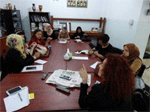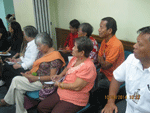Social Watch news
Published on Thu, 2014-09-25 13:35
The new government of Iraq, announced last September 8 by the new Prime Minister Haider al Abadi was resented by the major organizations of Iraqi women because it includes only one woman among its 25 members (22 ministers and three deputy Pms). The Iraqi Women Network expects more women in decision-making positions, as promised by politicians. “It is unfortunate, says IWN that women remain victims of patriarchal bargains in the distribution of ministerial positions and the consolidation of the policy of exclusion and discrimination against women”. The women activists agreed to continue demanding to increase the share of women in the ministries that still have not appointed ministers, as well as deputy ministers within the cabinet, in the chairmanship of the parliamentary committees and in the presidencies of the independent commissions and boards. |
Published on Thu, 2014-09-25 12:22
The United Nations General Assembly on 9 September adopted by vote the crucial draft resolution of the Group of 77 and China, "A/68/L.57/Rev2: Towards the establishment of a multilateral legal framework for sovereign debt restructuring processes." A majority of 124 countries voted for the resolution, 11 countries voted against it, while 41 countries abstained from a vote. A total of 176 countries out of the UN membership of 193 were present. |
Published on Thu, 2014-09-25 11:59
My last blog post on budgeting for human rights explored the obligation for governments to use the maximum of available resources to realize rights enshrined under the International Covenant on Economic, Social and Cultural Rights (ICESCR). Here we will examine what the obligation of progressive realization means for government budgets. |
Published on Thu, 2014-09-18 14:49
The United Nations General Assembly on 10 September adopted the Sustainable Development Goals (SDGs) outcome document. The resolution of the 68th session of the General Assembly was in line with developing countries' request that the report of the Open Working Group (OWG) on SDGs shall be the main basis for integrating sustainable development goals into the post-2015 development agenda. Meanwhile, the General Assembly recognises that other inputs will also be considered in the intergovernmental negotiation process at the sixty-ninth session of the General Assembly that was convened on 16 September. |
Published on Thu, 2014-09-18 10:21
Emerging social problems have shown that the characteristics of poverty in Thai society are becoming more complex, with differing forms of disparity and inequality. This basic understanding allows seeing the need to build a universal social welfare and protection system in Thailand because the current direction of development has marginalized the majority of the people. This situation has caused these people to become invisible. For example, migrant workers in Bangkok cannot access certain welfare services because their house registration is in the provinces. Therefore children’s problems cannot be resolved in isolation without linking them to other social issues. At the same time, society faces various increasing social, economic and natural disaster risks. There are more exploitative practices in the employment system. This is the situation for the majority of parents and guardians of young children for whom civil society is advocating a basic early childhood welfare system. |
Published on Wed, 2014-09-17 22:08
Human rights defender Ms Maryam Al-Khawaja will face trial on 1 October 2014 before the High Criminal Court for allegedly "assaulting a police officer". Maryam Al-Khawaja, is the acting president of the Bahrain Centre for Human Rights (BCHR) and the co-director of the Gulf Centre for Human Rights (GCHR). |
Published on Mon, 2014-09-15 18:03
Serious developments regarding the violations of rights in Egypt are becoming more evident, as the Ministry of Social Solidarity proposes a new law, which would constitute a dangerous escalation in the framework of systematic targeting of civil society activists and the increasing restrictions imposed upon them. On 26 June 2014, the Egyptian ministry in charge of regulating civil society organization proposed a new draft law, causing shockwaves among civil society organizations (CSOs) in the country. For six months, they had carried out negotiations with former Social Solidarity Minister Dr. Ahmed el-Boraei, which led to a proposed law to be presented to forthcoming parliament soon after the elections. |
Published on Thu, 2014-09-11 19:27
Social Watch Philippines challenged Congress to reclaim the power of the purse from the Executive at the SWP-Alternative Budget Initiative’s critique of the proposed 2015 budget at the House Committee on Appropriations CSO consultation last Wednesday, September 10, 2014. SWP-ABI also presented their alternative budget proposals for 2015 in the same meeting. SWP Lead Convenor Prof. Emeritus Leonor Magtolis Briones presented with a summary of the organization’s analysis of the 2015 proposed budget. She focusing on salient issues Congress faces with the current public finance system, such as congressional scrutiny, debt servicing and stark disparities in regional allocations of the budget. |
Published on Thu, 2014-09-11 09:37
We are at a crossroads in defining the future of sustainable development. Over the summer, UN member states hashed out some agreement on a proposed set of Sustainable Development Goals (SDGs) and targets, and simultaneously devised a ‘menu of options’ for financing these universal goals. The UN Secretary General’s office is at the grind now to synthesize these proposals and many more into a workable set of recommendations for what the post-2015 sustainable development framework could and should look like. As the post-2015 process now starts to harden and faultlines become more pronounced, experts and activists from the development, environmental and human rights communities are converging around a fairly straightforward argument. |
Published on Fri, 2014-09-05 17:39
The Group of 77 and China tabled at the United Nations a draft resolution to start negotiating a multilateral legal framework for the sovereign debt restructuring processes. By Roberto Bissio* |
SUSCRIBE TO OUR NEWSLETTER











